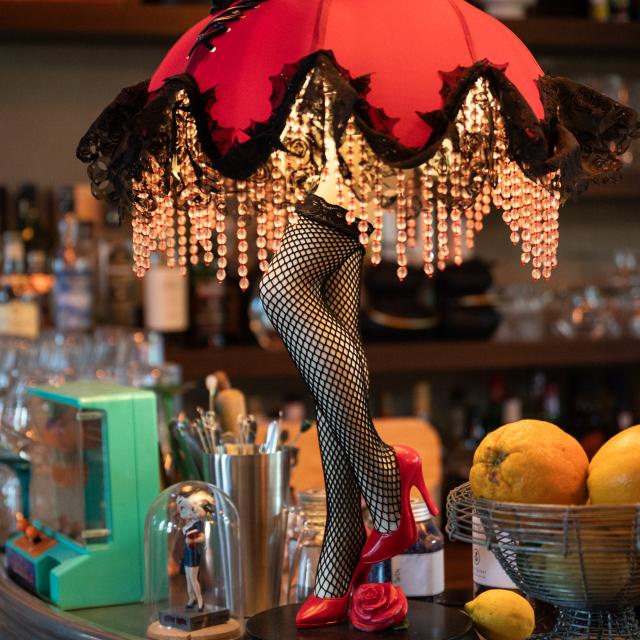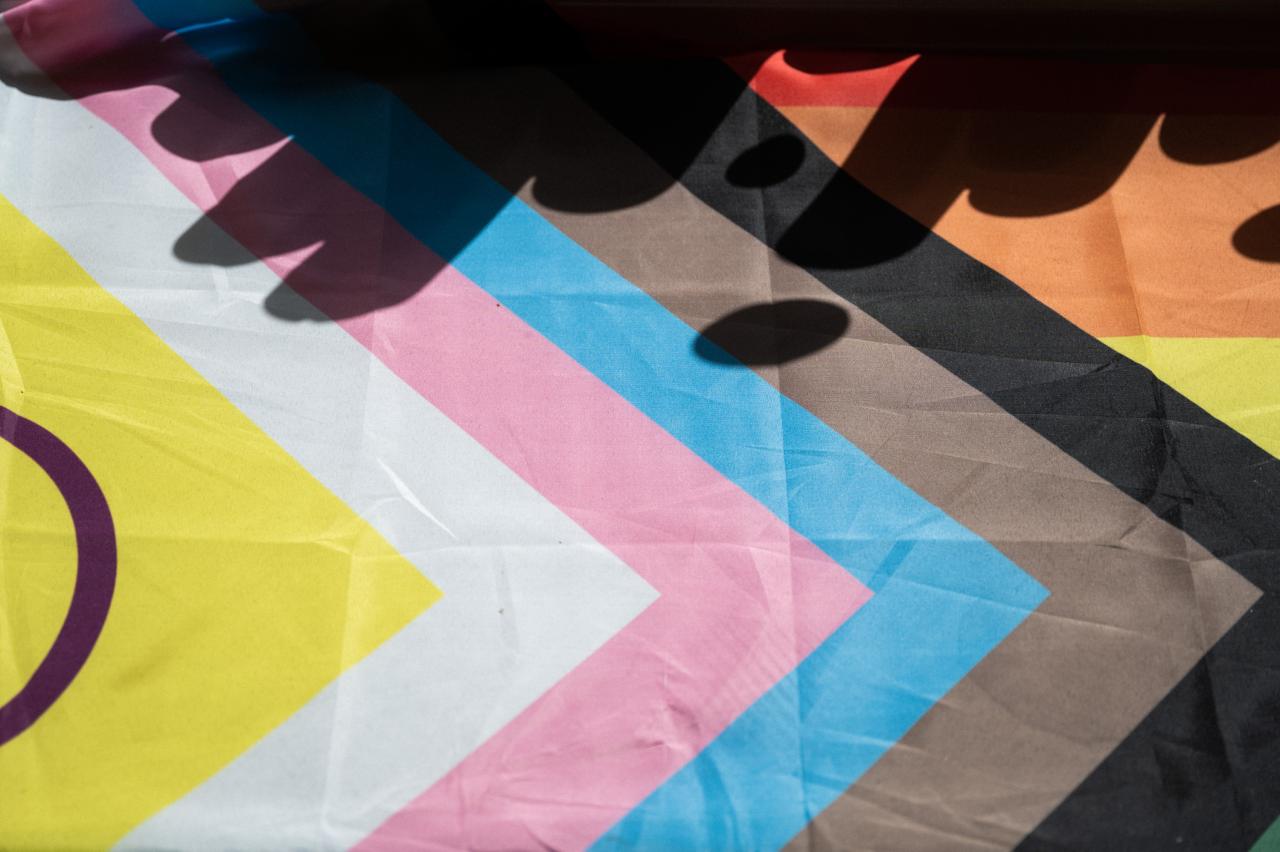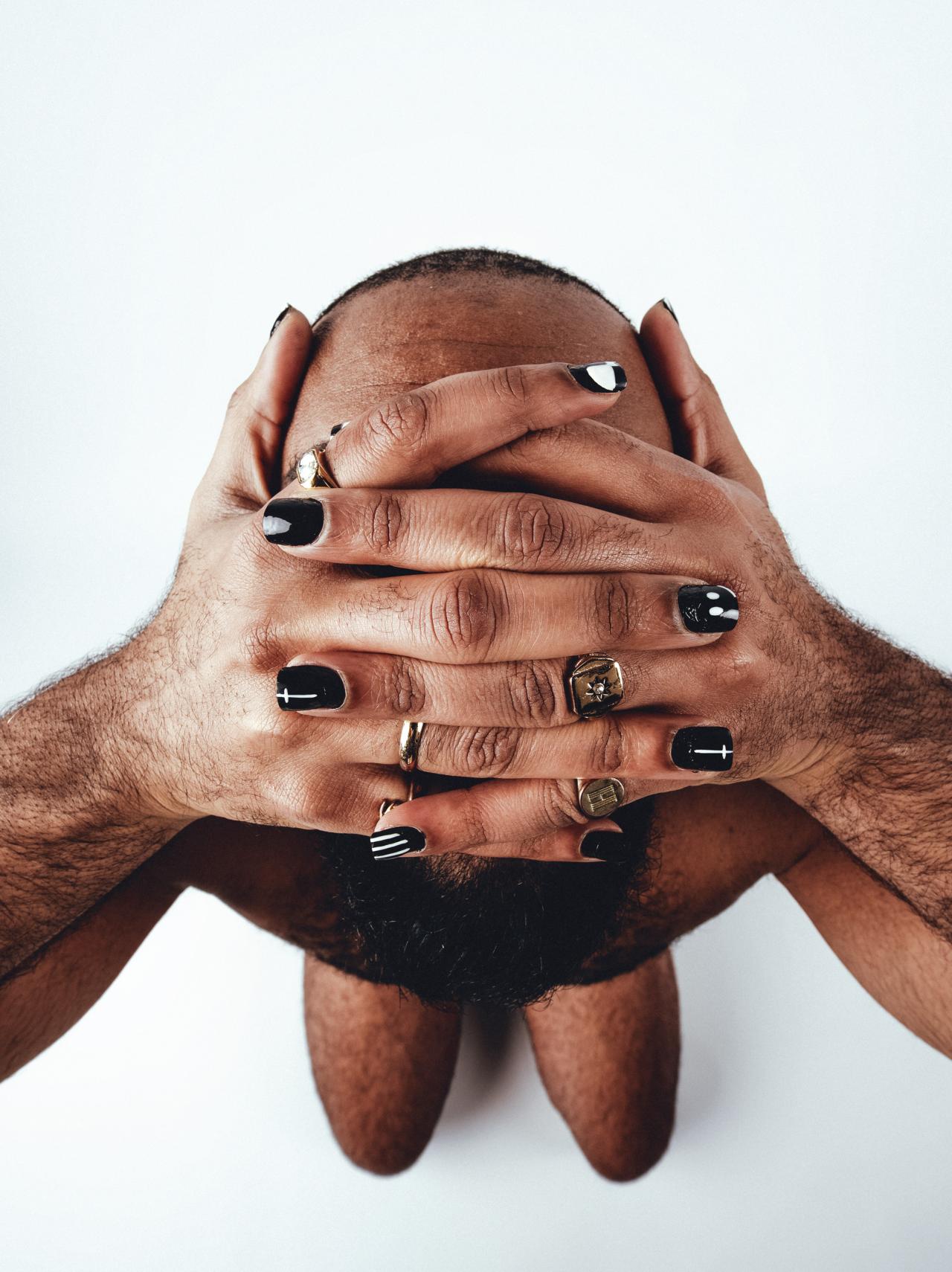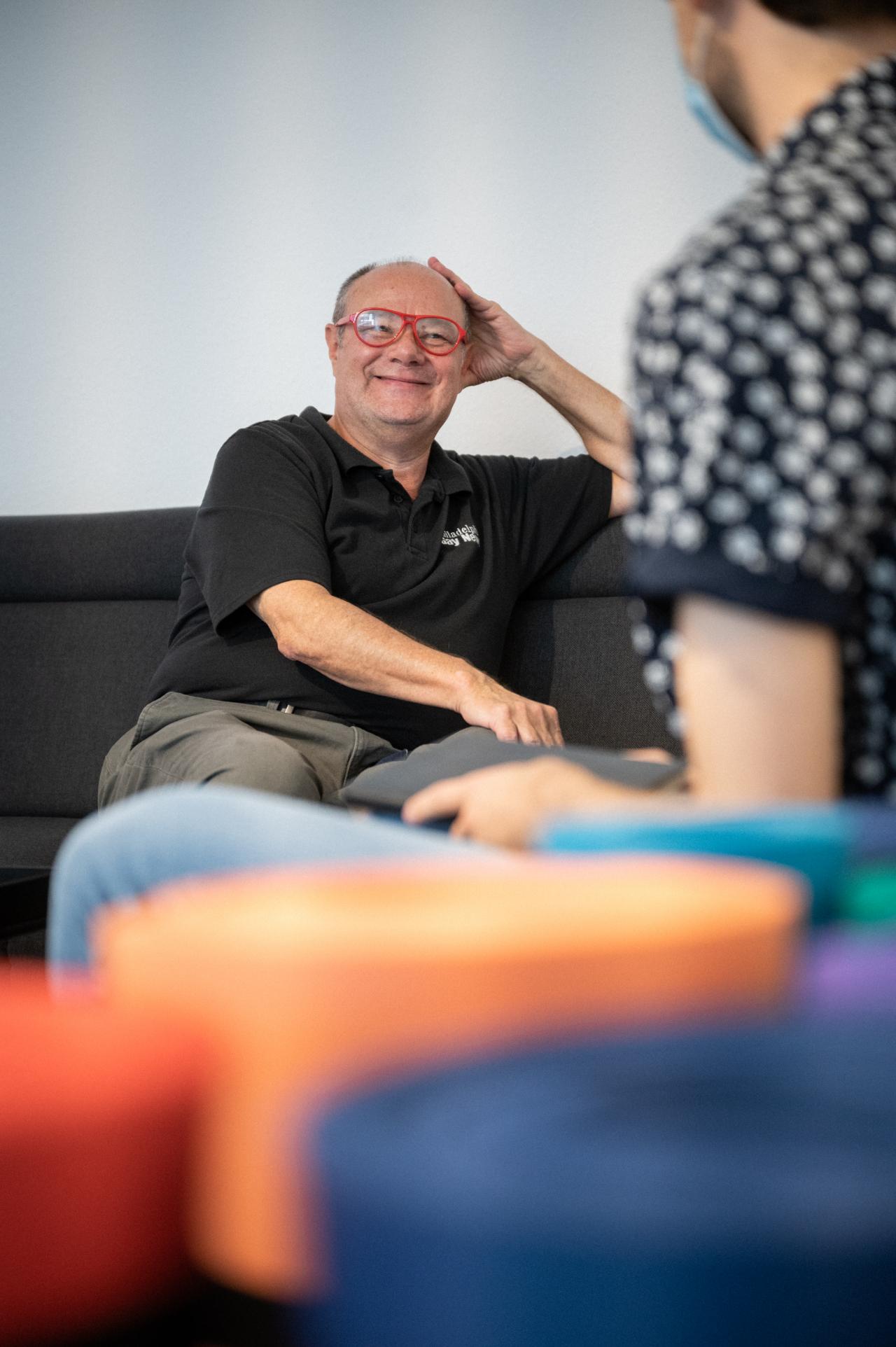
Listen to this article
Drag is an art form full of joy and entertainment as much as political activism and queer pride. While drag queens play with femininity, drag kings do so with masculinity. Lëtzebuerger Journal talked to the queens and kings of Luxembourg’s drag scene to get a glimpse behind the world of sequins and fake beards.
In the backstage room of the drag cabaret Brasserie Barnum in Redange, clothing racks full of colourful gowns and sequined jumpsuits fill the space. It is basically impossible to see a wall, because every centimetre of the room is used to store Madame Yoko’s costuming. Next to the door, a pair of fake breasts sits on a hanger. Medusa Venom jokingly says, "everyone who enters has to rub them. It’s for good luck". After she gave a quick tour of her drag mother’s dressing room, one thing is clear: this is a place where artistry takes place. Madame Yoko opened Barnum in 2018 to give the art of drag a consistent home in Luxembourg.
What is a drag queen?
Ian and Keano live their everyday lives as men, but have been performing in their drag characters over the past years as Madame Yoko and Medusa Venom. In preparation of a performance, both artists feminise their faces through makeup and reshape their bodies through padding and cushions. Once emerged in their alter ego, a drag performer entertains their audience by dancing, singing or surprising with any other talent. Madame Yoko likes to sing live to her audience in drag. For her, "it's also about putting on a whole show. I am on stage laughing, pulling jokes, being shady and just being fierce. There is no clear structure to my shows, it's about having a good time together". Medusa does a different kind of performance as a passionate lip-syncer. Lip-syncing is the art form of imitating the performance of a singer by moving your lips to a song as if you sing. Her inspiration has shifted, as "last year, I was in my old diva-era and I was performing lots of older songs. Now, I am rather doing pop icons like Lady Gaga. It always changes depending on my mood and my inspirations".

Ian aka Madame Yoko
Both emphasise that these are just their art practices as drag queens and that there is no clear definition of what a drag performance looks like. "I don't think there is a definition which would cover it all, " explains Medusa, "everybody can do drag. Women, men, cis and trans people, anyone! It's an expression of yourself, of your life. There are no rules to drag. Hair, clothes, makeup – it is up to you how you want to present your alter ego". Madame Yoko adds, that "it is a living art form, a performance".
The queens' talents are not only limited to makeup and performance. "I always sew my own outfits. Fashion has always been a passion of mine", Madame Yoko says. Both queens bought their first sewing machines during the pandemic and taught themselves how to sew. "It took me years to actually sew a good outfit, but once you wear your self-made outfit for the first time, it feels so amazing." Madame Yoko gives a quick side-eye to Medusa who sits right next to her. "It's also amazing, because you don't look like all the girls who buy their things from amazon." Medusa gasps as she just had showed Madame Yoko what she bought herself online.
Fem-tastic!
Drag is popular specifically within queer culture. In the case of drag queens, a performer plays with femininity and is celebrated for their creativity by their audience. Many queer people, for example gay men, have had repercussions for embracing their femininity and experienced bullying, discrimination and harassment due to their overt queerness. Becoming a drag queen thus means for a lot of artists to proudly celebrate their feminine side and being celebrated for their creativity.

Keano aka Medusa Venom
"Drag is about expressing something that is hidden within yourself, something that you cannot show every day. It makes it easier to be your authentic self, " Madame Yoko explains what being a drag queen means to her, "I have always been a very shy child. Drag gave me the possibility to jump into my alter ego, go onto the stage and do what I want!" With a big laugh, she explains that "actually as a boy, I cannot sing! Every time, we have Karaoke here at Barnum, people ask me to sing, and I will just tell them no!" Medusa agrees: "You can showcase as a drag queen what you have been enjoying so much in your childhood. All the diva songs, Disney movies, you can celebrate it all." Drag has been a liberating experience for them both. Even though you put on costumes and makeup, Medusa sees it as "not putting on layers to hide behind, but you put out the layers from within".
Making drag known
-
"Fada's Family definitively opened the gateways for the drag scene in Luxembourg," acknowledge both queens. The Fada's Family is Luxembourg's very first group of drag queens. Performing since 1978, they do drag shows at bars, clubs as well as street fests such as the Iechternacher Kiermes. While their group has changed over the past decades, they showcased their artistry to audiences in Luxembourg while also giving visibility to queer joy, specifically important during the AIDS crisis in the 80s and 90s. Just as Medusa and Madame Yoko noted, it is fair to say that they contributed to the acceptance of LGBTI+ people in contemporary Luxembourg.
-
RuPaul's Drag Race is an American reality competition television series documenting RuPaul in the search for "America's next drag superstar". RuPaul Andre Charles who is considered the most commercially successful drag queen in the United States, plays the role of host, mentor, and head judge for this series, as contestants are given different challenges each week. The show has spanned fifteen seasons so far and inspired several spin-offs as well as numerous international franchises including British, Australian and New Zealand versions hosted by RuPaul as well as Chilean, Thai, Canadian, Dutch, Spanish, Italian, French, Philippine, Belgian, Swedish, Mexican and German (in the making) editions as well as international vs. the World competitions hosted in the United Kingdom and Canada. RuPaul has paved the way for drag representation in mainstream media which has been rewarded with 12 Emmy Awards. The Liveshow RuPaul’s Drag Race Werq the world will stop in Luxembourg on October 24th 2023 with the cast of Angeria, Aquaria, Bosco, Daya Betty, Ginger Minj, Jaida Essence Hall, Kandy Muse and Vanessa Vanjie.
"And it's also liberating for our audience. At Barnum, I always notice how the audience forgets all their worries throughout the show. All that exists are the glitters, the music and the fun of it all, " explains Madame Yoko. Since 2018, Madame Yoko has been offering this safe space for queer artists and their audience in Luxembourg. There was a lot of uncertainty if she should open Barnum, but "there is another drag cabaret in Brussels, it's called Chez Maman. My husband asked me, 'don’t you want to become the Maman of Luxembourg, ' and I couldn't resist!" When hosting drag shows, visitors have repeatedly told Madame Yoko that, at Barnum, they wear their most colourful outfits which they do not dare to wear anywhere else. "It's soft activism that we do at Barnum! We don't display anywhere that this is a queer space, but we create this small world here for people to celebrate themselves." Medusa adds: "I would love to get to a time, where we don't have to call safe spaces safe spaces, because it means that everything else is unsafe."
From princesses to queens
In practical terms, becoming a drag performer "is a lot of trial and error". Starting out as a drag performer means trying out how to dress, how to do your makeup, how to perform and learning from your try-outs. "At the beginning, we looked like shit, but we were feeling so glamorous, " remembers Medusa.
"It's soft activism that we do at Barnum! We don't display anywhere that this is a queer space, but we create this small world here for people to celebrate themselves."
Madame Yoko, Luxembourgish drag queen and owner of the drag cabaret Barnum
Madame Yoko started out in 2016 in Brussels. "I got my makeup done by my drag mother back then [a drag mother is a mentor figure within the drag queen scene, ed.]. It wasn't that beautiful, but also not that bad – but when I looked into the mirror, I was just like: is that me? I felt beautiful! That night, when I opened the curtains of the cabaret, all my friends looked at me and I felt so great!" With bright eyes, she explains that she still fully slips into her character, "the moment when I put on my false eyelashes. It's so weird, I have already a full face of makeup on, but when I put on these false eyelashes, I become Madame Yoko".
Medusa started out as a drag queen, when she – or better said, when Keano was still in high school. "I had my coming out in 2015," Medusa explains the moment when she told her surrounding about her queerness, "before my coming out, I cared so much about what people thought about me. When someone called me gay, I would be so offended. But once I came out, people stopped making comments because they saw that I didn't care. When I then started doing drag, I posted about it online and my friends came to my shows. Even teachers talked about it in a good way. I never got a negative comment." Medusa remembers her mother, her biological mother, asking "'but can you walk in heels?', and I just replied, 'I was born in those heels.'"

Both of them met five years ago "at a drag competition, which was called 'Drags against AIDS'. The competition doesn't exist anymore, but we won. I mean I won, and she got second place, " recounts Madame Yoko. Medusa is quick to add within a lash beat, "two years later, I won". Ever since, they supported each other. Medusa started drag when she was 18 years old in 2018. At the competition, Madame Yoko saw her talent and helped Medusa to establish her drag character and to find her first shows in the Luxembourgish drag scene. "Now, she does it all by herself though!"
Protests against artists in princess dresses
While their immediate environment has been very supportive, both queens are aware of the queerphobic climate in Europe. "Since people listened to the news in the US, they started to think the same things here. We became more visible and they want to push us down again, " regrets Medusa. Throughout the US, there is a movement of criminalising drag and of limiting children's access to queer resources and trans health care.
"I am actually studying to become a primary school teacher and I would love to teach my students about gender diversity and the joys of artistic expression through drag."
Medusa Venom, Luxembourgish drag queen
Madame Yoko has a friend who experienced these queerphobic sentiments first-hand. When this friend did a drag story time for children in Brussels, people were protesting in front of the library. The protesters claim to protect children from early sexualisation, but Madame Yoko and Medusa strongly doubt that these protesters know what a drag story time actually means. At a drag story time, a drag performer reads out a story to children to promote inclusivity and celebrate diversity in a child-friendly manner. "I am actually studying to become a primary school teacher and I would love to teach my students about gender diversity and the joys of artistic expression through drag, " says Medusa, "but you would never do a children's story time in a red leather outfit and perform Oops, I did it! again by Britney Spears. People just ignore that. In reality, we are going to these children in fun princess dresses and read to them children's stories". Both note that, first of all, these drag story times are not sexual at all and, secondly, that children are constantly surrounded by sexuality – heterosexuality, but people only care about the visibility of queerness. "A straight father will be the first one to tell his son 'isn't that women hot'. They are the ones who sexualise their kids, " says Medusa.
To the question if drag is a political message, Madame Yoko exclaims that she "would love if we could just exist". She is sure that most people simply do not know what a drag performer is, but they have these untrue assumptions. "People always think that drag is something sexual. I get sent so many dick pics messaged via social media. They actually think they can book me for a night. I always have to explain that I am not a sex worker and will never be." Medusa does not understand where this assumption comes from, "people mix up all these ideas of drag queens, trans people and sex workers". Madame Yoko agrees as her mother asked her if she was transgender when she started with drag. "I told her 'no', I am very happy as a man and that's it. I just do drag because drag is fun!"
No Grand-Duchy without kings
Both queens agree that they have never seen a drag king in Luxembourg. "It's basically only gay men who are drag performers here, " agree both of them. Sandy Artuso for her part saw drag kings for the first time in Berlin. "The Drag Street Boys was the group’s name, and you can imagine what their repertoire looked like." Sandy does not know of any drag kings who perform in Luxembourg either, but she might be part of the first step towards establishing a local drag king scene. As part of the Queer Little Lies Festival in Luxembourg, Sandy organises drag king workshops in collaboration with xxyz ˥uxembourg. Artists from abroad, such as Victor Le Maure from France and Stephanie Weber from Germany, are invited to visit Luxembourg and host a workshop giving their tips and tricks on how to perform manhood. Victor Le Maure himself was taught drag by drag king pioneer Diane Torr.
Drag kings, their history and their present
-
Independent Little Lies is an artist and theatre collective from Luxembourg committed to addressing local, national and global contemporary issues through their events and productions. The Queer Little Lies festival was founded in 2018 because their team wanted "to organise a small festival to support and foster queer artists from Luxembourg and abroad," explains Sandy Artuso. The previous editions of the festival included writing workshops, exhibitions and drag king workshops. "The individual events are about empowering self-expression and self-determination. The Queer Little Lies festival also refers to an activist definition of queerness. It's not specifically about everything which is LGBTI+, but it is about the activist thought of queering society." More info here.
-
Diane Torr (1948-2017) was and is a source of inspiration for many drag kings. By performing gender-bending artistry from the 80s onwards, Diane Torr was a pioneer in the drag king scene and was active across the US and Europe. Similar to the Queer Little Lies festival, she also offered drag king workshops, labelled as Man for a Day workshop, to show to "hundreds of ordinary women how to pass as men on city streets around the world", as her website reads. For more information about Diane Torr's work, visit here.
-
Sandy mentions Stormé DeLarverie (1920-2014) as an important reference artist for many drag kings and feminist activists. Stormé is credited of being one of the key figures at the Stonewall Riots but is often forgotten when referring to the historical riots in New York City in 1969. During the riots, the police raided the queer bar Stonewall Inn in the Christopher Street, but the bar-goers did not tolerate the police brutality and started a riot against the police as Lëtzebuerger Journal reported several times already. Stormé remained a key queer activist throughout her life.
"The workshops dissect masculinity and play with it. We look at how we speak, how we move in space, how we sit, what mimic do we use. Based on that, you start creating your own character and experiment with it throughout one day at the workshop." In the third edition, we created boy bands with the participants and "at the end of the day, people had to lip-sync against each other in Backstreet Boys songs. This was so fun for everyone participating." The full transformation into the newfound drag persona includes embodied performance, gluing beards to the face and also packing. Packing is a way of imitating a bulge in the crotch. "Everyone does what they feel comfortable with. There is no pressure to do anything, but if someone wants to go all the way, that's fine too." The first two editions were hold at the Escher Theater and the third at the Bâtiment 4 in Esch.
When Sandy participated herself, it struck her how "this power position of the cis man can be achieved by simply sitting in a specific way. For example, you refuse to smile at anyone, and your posture gets different. It's these very subtle changes that make an impact." Sandy notes that women have been told "to sit straight, to be discreet and to not talk too loudly depending on how they were socialised" and it is interesting what happens if you consciously go against these societal expectations. While Madame Yoko noted on the impact of putting on false eye lashes, Sandy remembers that "putting on a beard can make such a difference when getting into this masculine character".



"The hosts of the workshops sometimes note that the event is for everyone who is not cis male to ensure that everyone feels comfortable when experimenting with masculinity." While most participants were queer, several straight cis women also joined the event and Sandy encourages everyone who is interested to sign up. The organising team makes sure to alternate the languages of the hosted workshops to assure their events are accessible to everyone in Luxembourg. "When our workshop was hosted in French, we even had participants coming from Belgium to Esch! It says a lot about how people want to participate in these kinds of events but that the offer is limited."
A royal family
"Community building is a large part of these workshops, and it can also get very personal, " explains Sandy, as trans, cis, and questioning people can explore freely their gender expression. "Sometimes, I get annoyed when people portray this as simply dressing up as men. It's not just about makeup and outfits, but also about a lot of reflections about how we experience gender."
"Sometimes, I get annoyed when people portray this as simply dressing up as men. It's not just about makeup and outfits, but also about a lot of reflections about how we experience gender."
Sandy Artuso, organiser of the Queer Little Lies festival
Josée has been participating in these drag king workshops for the past years. "During these workshops, I always notice for myself that there is no universal, everlasting truth about gender. Gender is rather constructed through performances." She really enjoys the workshops because they push her to pay close attention to her everyday life. "Victor Le Maure noted that men in Paris scratch their crotch in public spaces without a second thought. A woman would probably not do so." Josée remembers that, after one of the workshops, the people who were comfortable in their alter ego went out in drag and "it was a blast. The whole event is about deconstructing gender stereotypes and having fun as a group." Sandy recommends drag workshops to everyone because "both cis men and cis women would benefit from exploring what gender actually means to them".
Give those kings and queens some diamonds!
Sandy explains Luxembourg's lack in drag kings might be a reaction to the queer-feminist statement behind their artistry. "Drag queens are often portrayed as rather flashy, glittery and fun performers – even though they also might have political statements, but a king visibly destabilises the patriarchy" and there is a history of lacking support for empowering feminist art. Sandy emphasises that drag kings need spaces to perform in and financial and creative support in order to thrive – but queens ask for the same.
Medusa Venom does not understand why "people are always shocked about how much it costs to book a drag performance for an event. What did they think? One of our wigs costs 500 euros and then they want to pay us 100 for 5 or 6 hours in drag". Madame Yoko is now full-time working on her drag and her drag cabaret at Barnum. "If you want me to perform somewhere, please keep in mind that this work is how I pay my bills. A good lip-sync or singing live is a lot of work." Asking a drag artist to perform for free is "not cute" and makes it difficult to finance their art in the long run.








